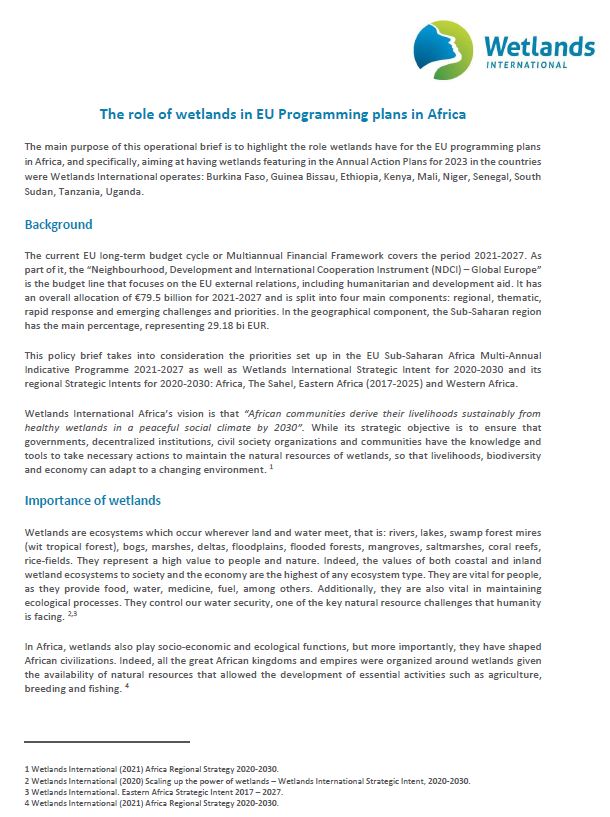
The role of wetlands in EU Programming plans in Africa – Briefing
This briefing highlights the role of wetlands and Wetlands International’s work in EU programming plans in Africa. The main aim of the operational briefing is to highlight the role of wetlands in EU programming plans in Africa, with a specific focus on integrating wetlands into the Annual Action Plans for 2023 in the countries where Wetlands International operates: Burkina Faso, Guinea Bissau, Ethiopia, Kenya, Mali, Niger, Senegal, South Sudan, Tanzania, Uganda.
Recommendations
Wetlands International expects the African countries’ Annual Action Plans for 2023 to focus more on wetlands and freshwater ecosystems. They should incorporate the following recommendations and identified landscapes:
Eastern Africa:
- Invest in sustainably managed landscapes that support livelihoods and healthy habitats for biodiversity. Additionally, support the blue lifelines for the people that depend on them, and strengthen public and community institutions working towards improved natural resources use. Landscape: Horn of Africa Rivers.
- Support projects that utilize, restore and conserve ecosystems and biodiversity through an integrated landscape management approach. Landscape: Upper Nile Rivers and Wetlands.
- Ensure the wise use of wetlands and water resources to sustain economic growth, improve livelihoods, a healthy environment, and biodiversity and climate resilience. Additionally, turn water crises into opportunities for peacebuilding via knowledge building, mobilising action and dialogues. Landscape: Rift Valley Lakes and Wetlands.
- Support the sustainable management of mangrove ecosystems. Landscape: Eastern Africa Mangrove ecoregion.
- Support community-based conservation and restoration to improve community resilience, and reduce and use change of peatlands for RCR. Landscape: Kogera basin, Blue Nile, Lake Victoria basin, Sudd.
The Sahel:
- Promote the increased participation of civil society and other stakeholders in the process of reducing violent conflicts related to water sharing and management. Landscape: Inner Niger Delta.
- Support the implementation of Integrated Water Resource Management in the Sahel countries to safeguard wetlands. Landscape: Western Sahel.
- Improve the status of migratory wetland fauna in Sahelian countries. Landscape: wetlands of the Sahel.
How wetlands contribute and can continue contributing to EU Programming strategic objectives
Coasts and Deltas – Healthy wetlands habitats
Wetlands International’s priorities related to wetland management plans, policies and protocols, as well as a focus on multi-stakeholder platforms can contribute to achieving EU programming priorities in the “Green Transition” area. However, additionally, the other areas’ priorities can be supported, for example, by contributing to education and skills, and supporting migration plans.
Coasts and Deltas – Resilient communities and reduced climate risks
Wetlands International’s priorities in building knowledge and the scientific evidence base can contribute to several EU priorities, such as: culture, biodiversity & environment, sustainable finance and migration. Whereas, by supporting sustainable production for agriculture, fisheries and aquaculture, sustainable finance and agri-food systems area is developed. The EU’s peace and security priorities can be accomplished by promoting the inclusion of marginalized groups and women in decision-making processes as well as implementation.
Rivers and Lakes
Wetlands International’s priority of engaging in international and regional landscape management initiatives can contribute to the Green Transition priority, but also to health and migration. On the other hand, Education and Peace & Security can be supported via the inclusion of marginalized groups, as well as strengthening the capacities of relevant organizations.
Peatlands
Wetlands International’s priority of scaling up the restoration and conservation of peatlands in the Nile Basin landscape would contribute to the EU priority on Green Transition specifically regarding climate mitigation and resilience, biodiversity and environment as well as sustainable growth. This priority focuses on ensuring intact peatlands remain and drained peatlands are restored as a contribution to conservation, climate mitigation and adaptation and sustainable development by facilitating knowledge development and exchange, as well as advancing capacity building in policy and practice.

